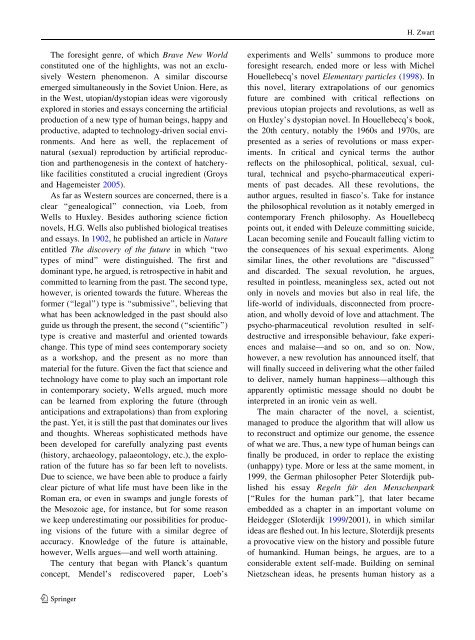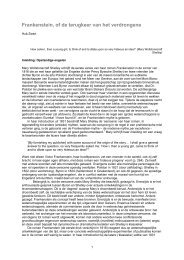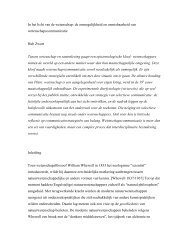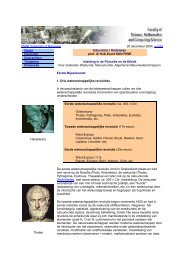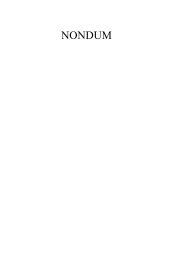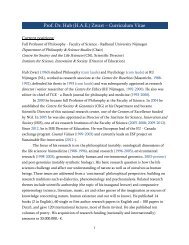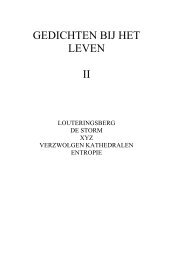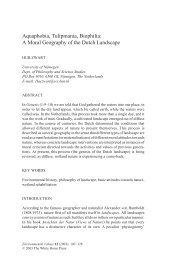Download - Hub Zwart
Download - Hub Zwart
Download - Hub Zwart
- No tags were found...
Create successful ePaper yourself
Turn your PDF publications into a flip-book with our unique Google optimized e-Paper software.
H. <strong>Zwart</strong>The foresight genre, of which Brave New Worldconstituted one of the highlights, was not an exclusivelyWestern phenomenon. A similar discourseemerged simultaneously in the Soviet Union. Here, asin the West, utopian/dystopian ideas were vigorouslyexplored in stories and essays concerning the artificialproduction of a new type of human beings, happy andproductive, adapted to technology-driven social environments.And here as well, the replacement ofnatural (sexual) reproduction by artificial reproductionand parthenogenesis in the context of hatcherylikefacilities constituted a crucial ingredient (Groysand Hagemeister 2005).As far as Western sources are concerned, there is aclear ‘‘genealogical’’ connection, via Loeb, fromWells to Huxley. Besides authoring science fictionnovels, H.G. Wells also published biological treatisesand essays. In 1902, he published an article in Natureentitled The discovery of the future in which ‘‘twotypes of mind’’ were distinguished. The first anddominant type, he argued, is retrospective in habit andcommitted to learning from the past. The second type,however, is oriented towards the future. Whereas theformer (‘‘legal’’) type is ‘‘submissive’’, believing thatwhat has been acknowledged in the past should alsoguide us through the present, the second (‘‘scientific’’)type is creative and masterful and oriented towardschange. This type of mind sees contemporary societyas a workshop, and the present as no more thanmaterial for the future. Given the fact that science andtechnology have come to play such an important rolein contemporary society, Wells argued, much morecan be learned from exploring the future (throughanticipations and extrapolations) than from exploringthe past. Yet, it is still the past that dominates our livesand thoughts. Whereas sophisticated methods havebeen developed for carefully analyzing past events(history, archaeology, palaeontology, etc.), the explorationof the future has so far been left to novelists.Due to science, we have been able to produce a fairlyclear picture of what life must have been like in theRoman era, or even in swamps and jungle forests ofthe Mesozoic age, for instance, but for some reasonwe keep underestimating our possibilities for producingvisions of the future with a similar degree ofaccuracy. Knowledge of the future is attainable,however, Wells argues—and well worth attaining.The century that began with Planck’s quantumconcept, Mendel’s rediscovered paper, Loeb’sexperiments and Wells’ summons to produce moreforesight research, ended more or less with MichelHouellebecq’s novel Elementary particles (1998). Inthis novel, literary extrapolations of our genomicsfuture are combined with critical reflections onprevious utopian projects and revolutions, as well ason Huxley’s dystopian novel. In Houellebecq’s book,the 20th century, notably the 1960s and 1970s, arepresented as a series of revolutions or mass experiments.In critical and cynical terms the authorreflects on the philosophical, political, sexual, cultural,technical and psycho-pharmaceutical experimentsof past decades. All these revolutions, theauthor argues, resulted in fiasco’s. Take for instancethe philosophical revolution as it notably emerged incontemporary French philosophy. As Houellebecqpoints out, it ended with Deleuze committing suicide,Lacan becoming senile and Foucault falling victim tothe consequences of his sexual experiments. Alongsimilar lines, the other revolutions are ‘‘discussed’’and discarded. The sexual revolution, he argues,resulted in pointless, meaningless sex, acted out notonly in novels and movies but also in real life, thelife-world of individuals, disconnected from procreation,and wholly devoid of love and attachment. Thepsycho-pharmaceutical revolution resulted in selfdestructiveand irresponsible behaviour, fake experiencesand malaise—and so on, and so on. Now,however, a new revolution has announced itself, thatwill finally succeed in delivering what the other failedto deliver, namely human happiness—although thisapparently optimistic message should no doubt beinterpreted in an ironic vein as well.The main character of the novel, a scientist,managed to produce the algorithm that will allow usto reconstruct and optimize our genome, the essenceof what we are. Thus, a new type of human beings canfinally be produced, in order to replace the existing(unhappy) type. More or less at the same moment, in1999, the German philosopher Peter Sloterdijk publishedhis essay Regeln für den Menschenpark[‘‘Rules for the human park’’], that later becameembedded as a chapter in an important volume onHeidegger (Sloterdijk 1999/2001), in which similarideas are fleshed out. In his lecture, Sloterdijk presentsa provocative view on the history and possible futureof humankind. Human beings, he argues, are to aconsiderable extent self-made. Building on seminalNietzschean ideas, he presents human history as a123


